Healthcare Essay: Effects of Procrastination and Management Strategies
VerifiedAdded on 2023/01/19
|10
|2774
|96
Essay
AI Summary
This essay provides a comprehensive literature review on the effects of procrastination within the context of healthcare. It explores the detrimental impacts of procrastination on academic performance, stress levels, and overall well-being, referencing various studies and research findings. The essay delves into the psychological aspects of procrastination, including factors such as self-understanding, stress, fear of failure, and self-regulation issues. It examines how procrastination can lead to short-term benefits but long-term costs, affecting students and working professionals alike. Furthermore, the review discusses effective management strategies, such as time management, self-compassion, and self-control, to mitigate the negative consequences of procrastination. The essay also touches upon the influence of social media, work-life balance, and other contributing factors. The conclusion emphasizes the need for interventions, like time management and building self-confidence, to combat procrastination and improve outcomes in both academic and professional settings.
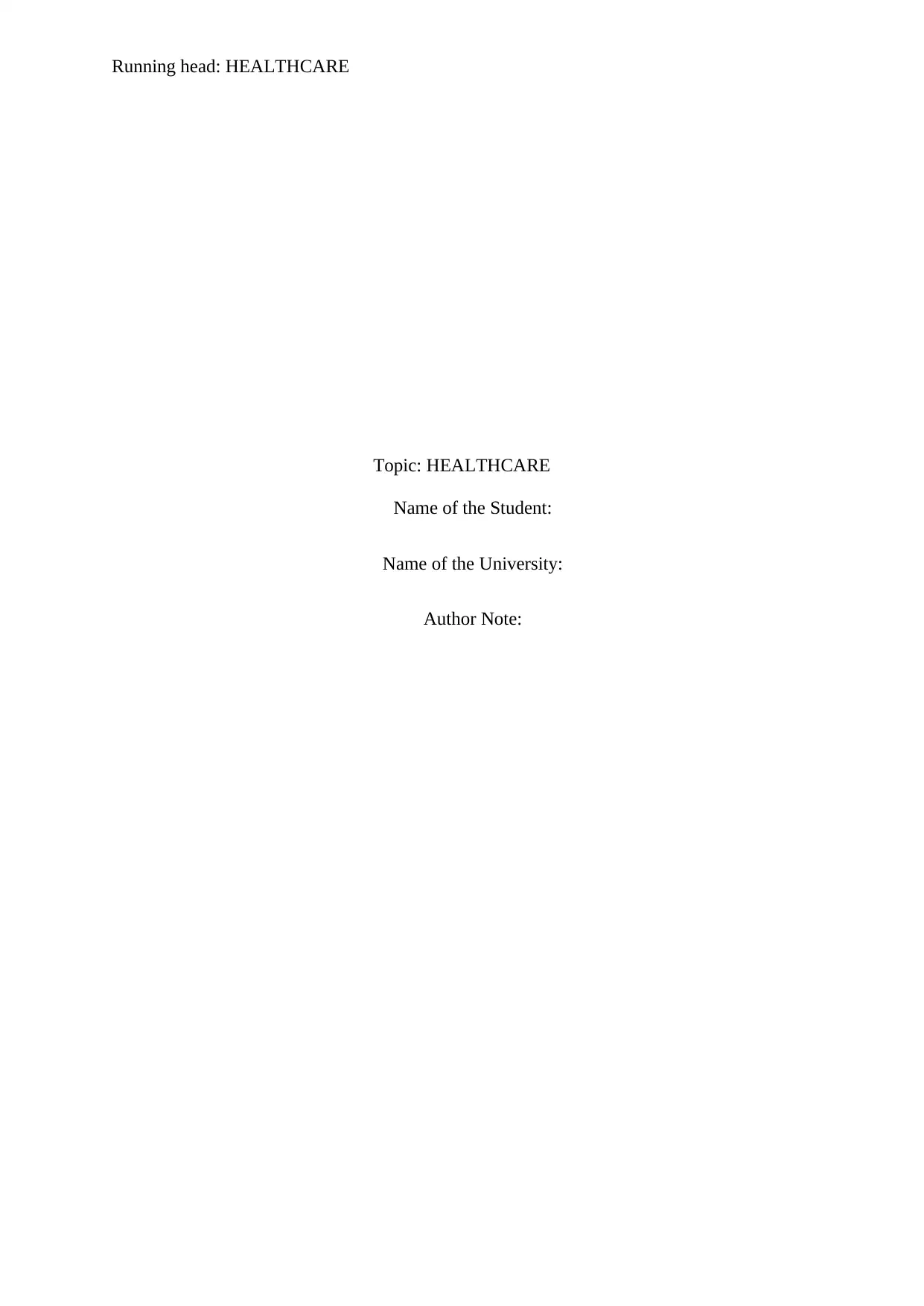
Running head: HEALTHCARE
Topic: HEALTHCARE
Name of the Student:
Name of the University:
Author Note:
Topic: HEALTHCARE
Name of the Student:
Name of the University:
Author Note:
Paraphrase This Document
Need a fresh take? Get an instant paraphrase of this document with our AI Paraphraser
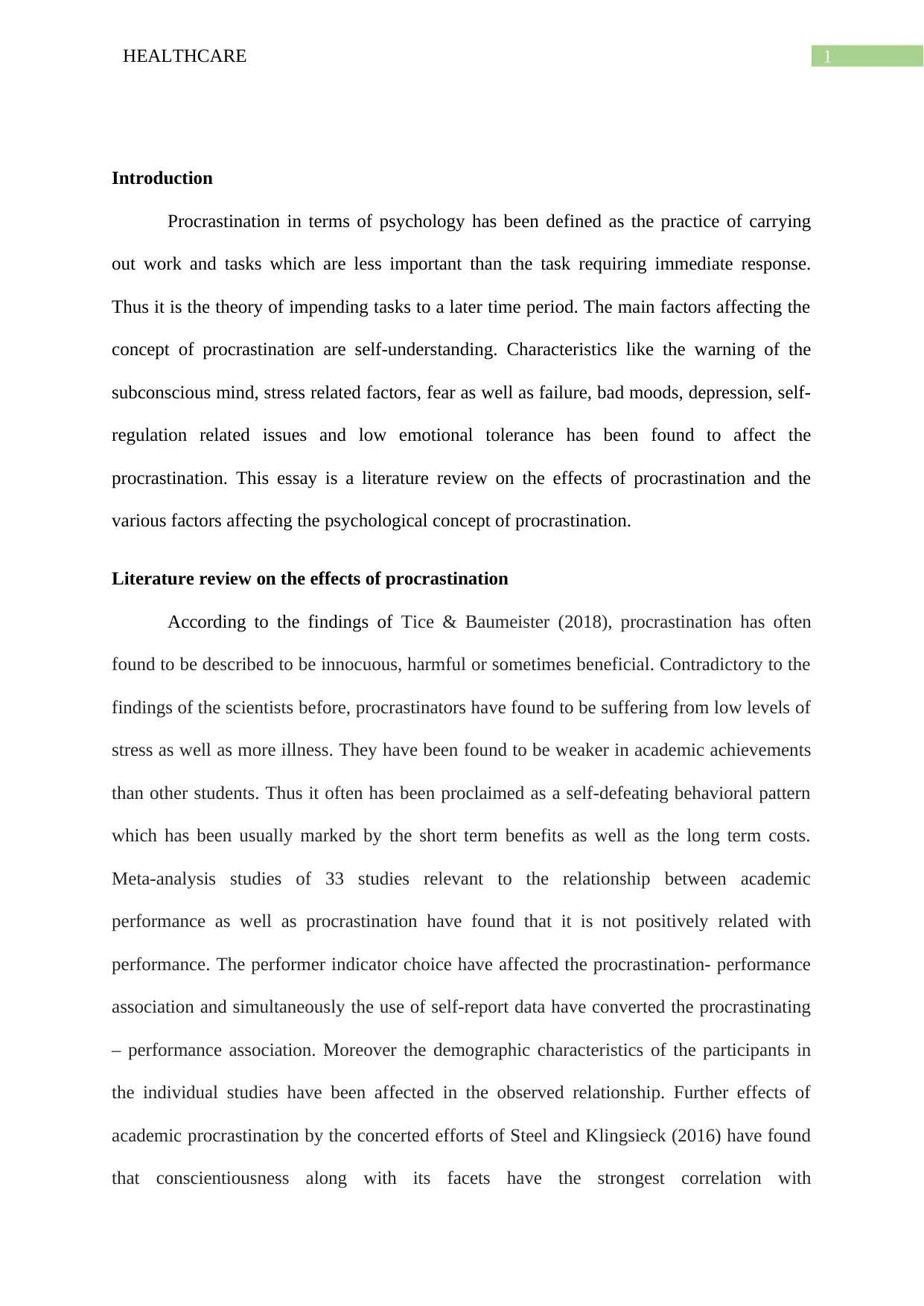
1HEALTHCARE
Introduction
Procrastination in terms of psychology has been defined as the practice of carrying
out work and tasks which are less important than the task requiring immediate response.
Thus it is the theory of impending tasks to a later time period. The main factors affecting the
concept of procrastination are self-understanding. Characteristics like the warning of the
subconscious mind, stress related factors, fear as well as failure, bad moods, depression, self-
regulation related issues and low emotional tolerance has been found to affect the
procrastination. This essay is a literature review on the effects of procrastination and the
various factors affecting the psychological concept of procrastination.
Literature review on the effects of procrastination
According to the findings of Tice & Baumeister (2018), procrastination has often
found to be described to be innocuous, harmful or sometimes beneficial. Contradictory to the
findings of the scientists before, procrastinators have found to be suffering from low levels of
stress as well as more illness. They have been found to be weaker in academic achievements
than other students. Thus it often has been proclaimed as a self-defeating behavioral pattern
which has been usually marked by the short term benefits as well as the long term costs.
Meta-analysis studies of 33 studies relevant to the relationship between academic
performance as well as procrastination have found that it is not positively related with
performance. The performer indicator choice have affected the procrastination- performance
association and simultaneously the use of self-report data have converted the procrastinating
– performance association. Moreover the demographic characteristics of the participants in
the individual studies have been affected in the observed relationship. Further effects of
academic procrastination by the concerted efforts of Steel and Klingsieck (2016) have found
that conscientiousness along with its facets have the strongest correlation with
Introduction
Procrastination in terms of psychology has been defined as the practice of carrying
out work and tasks which are less important than the task requiring immediate response.
Thus it is the theory of impending tasks to a later time period. The main factors affecting the
concept of procrastination are self-understanding. Characteristics like the warning of the
subconscious mind, stress related factors, fear as well as failure, bad moods, depression, self-
regulation related issues and low emotional tolerance has been found to affect the
procrastination. This essay is a literature review on the effects of procrastination and the
various factors affecting the psychological concept of procrastination.
Literature review on the effects of procrastination
According to the findings of Tice & Baumeister (2018), procrastination has often
found to be described to be innocuous, harmful or sometimes beneficial. Contradictory to the
findings of the scientists before, procrastinators have found to be suffering from low levels of
stress as well as more illness. They have been found to be weaker in academic achievements
than other students. Thus it often has been proclaimed as a self-defeating behavioral pattern
which has been usually marked by the short term benefits as well as the long term costs.
Meta-analysis studies of 33 studies relevant to the relationship between academic
performance as well as procrastination have found that it is not positively related with
performance. The performer indicator choice have affected the procrastination- performance
association and simultaneously the use of self-report data have converted the procrastinating
– performance association. Moreover the demographic characteristics of the participants in
the individual studies have been affected in the observed relationship. Further effects of
academic procrastination by the concerted efforts of Steel and Klingsieck (2016) have found
that conscientiousness along with its facets have the strongest correlation with
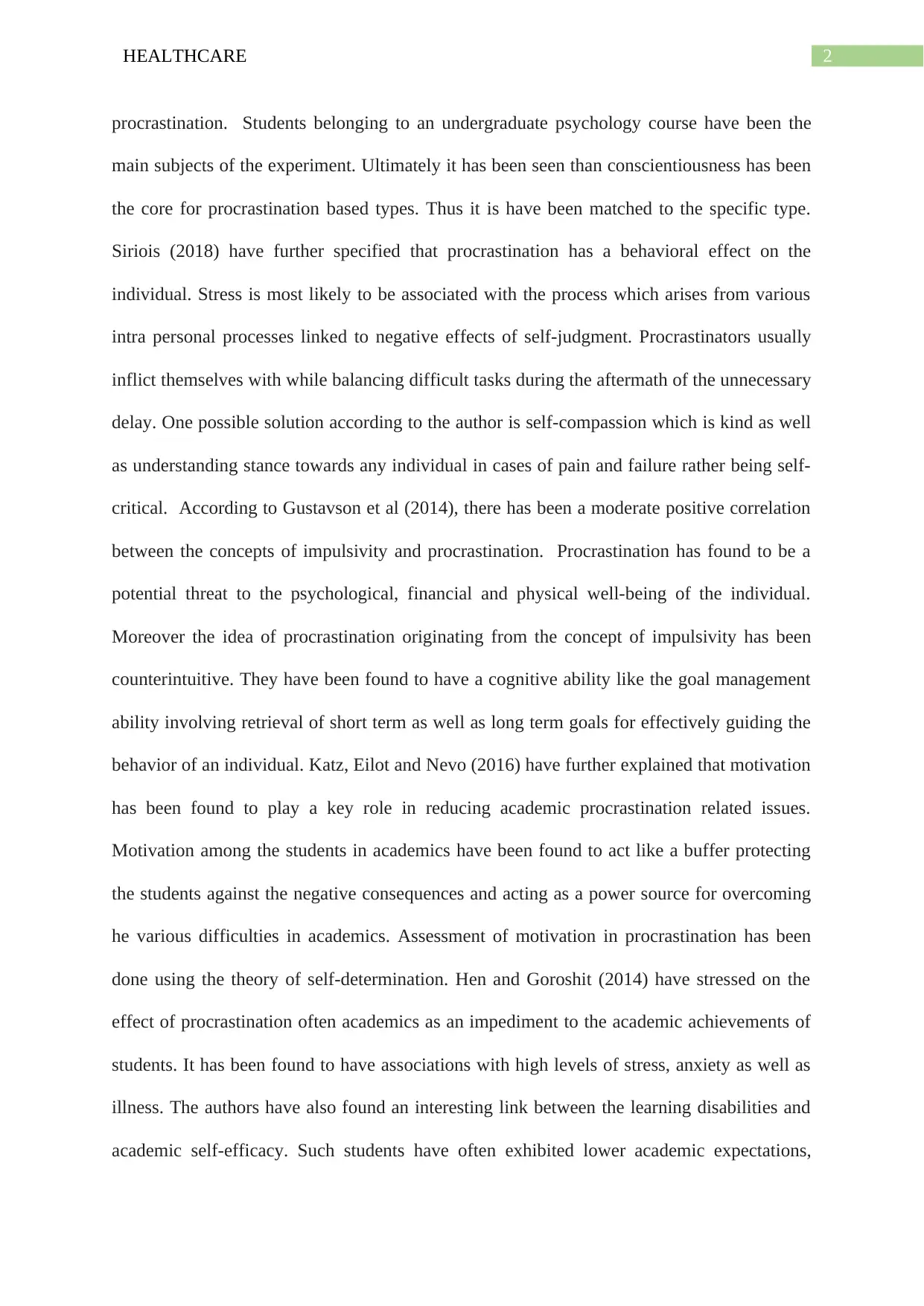
2HEALTHCARE
procrastination. Students belonging to an undergraduate psychology course have been the
main subjects of the experiment. Ultimately it has been seen than conscientiousness has been
the core for procrastination based types. Thus it is have been matched to the specific type.
Siriois (2018) have further specified that procrastination has a behavioral effect on the
individual. Stress is most likely to be associated with the process which arises from various
intra personal processes linked to negative effects of self-judgment. Procrastinators usually
inflict themselves with while balancing difficult tasks during the aftermath of the unnecessary
delay. One possible solution according to the author is self-compassion which is kind as well
as understanding stance towards any individual in cases of pain and failure rather being self-
critical. According to Gustavson et al (2014), there has been a moderate positive correlation
between the concepts of impulsivity and procrastination. Procrastination has found to be a
potential threat to the psychological, financial and physical well-being of the individual.
Moreover the idea of procrastination originating from the concept of impulsivity has been
counterintuitive. They have been found to have a cognitive ability like the goal management
ability involving retrieval of short term as well as long term goals for effectively guiding the
behavior of an individual. Katz, Eilot and Nevo (2016) have further explained that motivation
has been found to play a key role in reducing academic procrastination related issues.
Motivation among the students in academics have been found to act like a buffer protecting
the students against the negative consequences and acting as a power source for overcoming
he various difficulties in academics. Assessment of motivation in procrastination has been
done using the theory of self-determination. Hen and Goroshit (2014) have stressed on the
effect of procrastination often academics as an impediment to the academic achievements of
students. It has been found to have associations with high levels of stress, anxiety as well as
illness. The authors have also found an interesting link between the learning disabilities and
academic self-efficacy. Such students have often exhibited lower academic expectations,
procrastination. Students belonging to an undergraduate psychology course have been the
main subjects of the experiment. Ultimately it has been seen than conscientiousness has been
the core for procrastination based types. Thus it is have been matched to the specific type.
Siriois (2018) have further specified that procrastination has a behavioral effect on the
individual. Stress is most likely to be associated with the process which arises from various
intra personal processes linked to negative effects of self-judgment. Procrastinators usually
inflict themselves with while balancing difficult tasks during the aftermath of the unnecessary
delay. One possible solution according to the author is self-compassion which is kind as well
as understanding stance towards any individual in cases of pain and failure rather being self-
critical. According to Gustavson et al (2014), there has been a moderate positive correlation
between the concepts of impulsivity and procrastination. Procrastination has found to be a
potential threat to the psychological, financial and physical well-being of the individual.
Moreover the idea of procrastination originating from the concept of impulsivity has been
counterintuitive. They have been found to have a cognitive ability like the goal management
ability involving retrieval of short term as well as long term goals for effectively guiding the
behavior of an individual. Katz, Eilot and Nevo (2016) have further explained that motivation
has been found to play a key role in reducing academic procrastination related issues.
Motivation among the students in academics have been found to act like a buffer protecting
the students against the negative consequences and acting as a power source for overcoming
he various difficulties in academics. Assessment of motivation in procrastination has been
done using the theory of self-determination. Hen and Goroshit (2014) have stressed on the
effect of procrastination often academics as an impediment to the academic achievements of
students. It has been found to have associations with high levels of stress, anxiety as well as
illness. The authors have also found an interesting link between the learning disabilities and
academic self-efficacy. Such students have often exhibited lower academic expectations,
⊘ This is a preview!⊘
Do you want full access?
Subscribe today to unlock all pages.

Trusted by 1+ million students worldwide
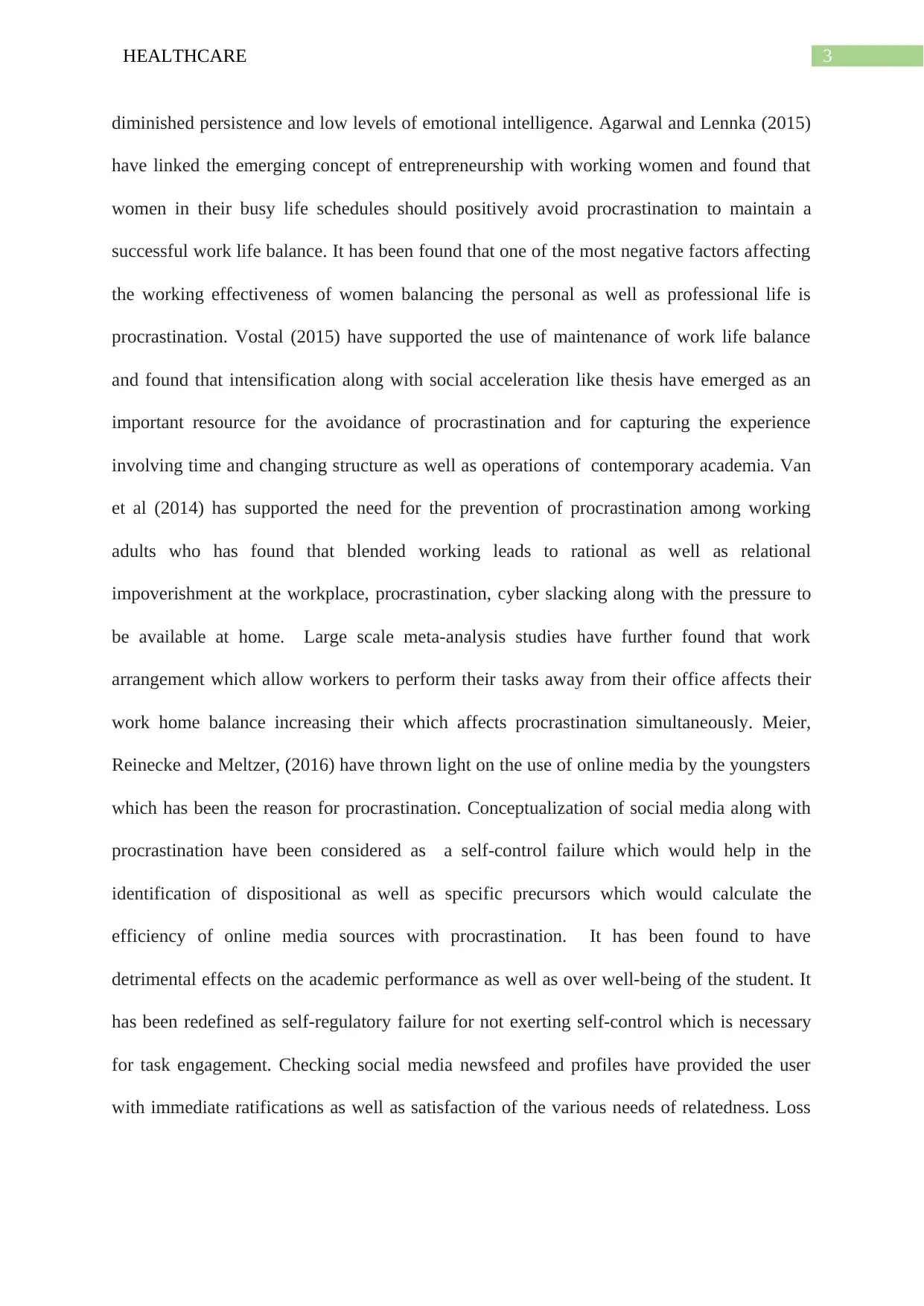
3HEALTHCARE
diminished persistence and low levels of emotional intelligence. Agarwal and Lennka (2015)
have linked the emerging concept of entrepreneurship with working women and found that
women in their busy life schedules should positively avoid procrastination to maintain a
successful work life balance. It has been found that one of the most negative factors affecting
the working effectiveness of women balancing the personal as well as professional life is
procrastination. Vostal (2015) have supported the use of maintenance of work life balance
and found that intensification along with social acceleration like thesis have emerged as an
important resource for the avoidance of procrastination and for capturing the experience
involving time and changing structure as well as operations of contemporary academia. Van
et al (2014) has supported the need for the prevention of procrastination among working
adults who has found that blended working leads to rational as well as relational
impoverishment at the workplace, procrastination, cyber slacking along with the pressure to
be available at home. Large scale meta-analysis studies have further found that work
arrangement which allow workers to perform their tasks away from their office affects their
work home balance increasing their which affects procrastination simultaneously. Meier,
Reinecke and Meltzer, (2016) have thrown light on the use of online media by the youngsters
which has been the reason for procrastination. Conceptualization of social media along with
procrastination have been considered as a self-control failure which would help in the
identification of dispositional as well as specific precursors which would calculate the
efficiency of online media sources with procrastination. It has been found to have
detrimental effects on the academic performance as well as over well-being of the student. It
has been redefined as self-regulatory failure for not exerting self-control which is necessary
for task engagement. Checking social media newsfeed and profiles have provided the user
with immediate ratifications as well as satisfaction of the various needs of relatedness. Loss
diminished persistence and low levels of emotional intelligence. Agarwal and Lennka (2015)
have linked the emerging concept of entrepreneurship with working women and found that
women in their busy life schedules should positively avoid procrastination to maintain a
successful work life balance. It has been found that one of the most negative factors affecting
the working effectiveness of women balancing the personal as well as professional life is
procrastination. Vostal (2015) have supported the use of maintenance of work life balance
and found that intensification along with social acceleration like thesis have emerged as an
important resource for the avoidance of procrastination and for capturing the experience
involving time and changing structure as well as operations of contemporary academia. Van
et al (2014) has supported the need for the prevention of procrastination among working
adults who has found that blended working leads to rational as well as relational
impoverishment at the workplace, procrastination, cyber slacking along with the pressure to
be available at home. Large scale meta-analysis studies have further found that work
arrangement which allow workers to perform their tasks away from their office affects their
work home balance increasing their which affects procrastination simultaneously. Meier,
Reinecke and Meltzer, (2016) have thrown light on the use of online media by the youngsters
which has been the reason for procrastination. Conceptualization of social media along with
procrastination have been considered as a self-control failure which would help in the
identification of dispositional as well as specific precursors which would calculate the
efficiency of online media sources with procrastination. It has been found to have
detrimental effects on the academic performance as well as over well-being of the student. It
has been redefined as self-regulatory failure for not exerting self-control which is necessary
for task engagement. Checking social media newsfeed and profiles have provided the user
with immediate ratifications as well as satisfaction of the various needs of relatedness. Loss
Paraphrase This Document
Need a fresh take? Get an instant paraphrase of this document with our AI Paraphraser
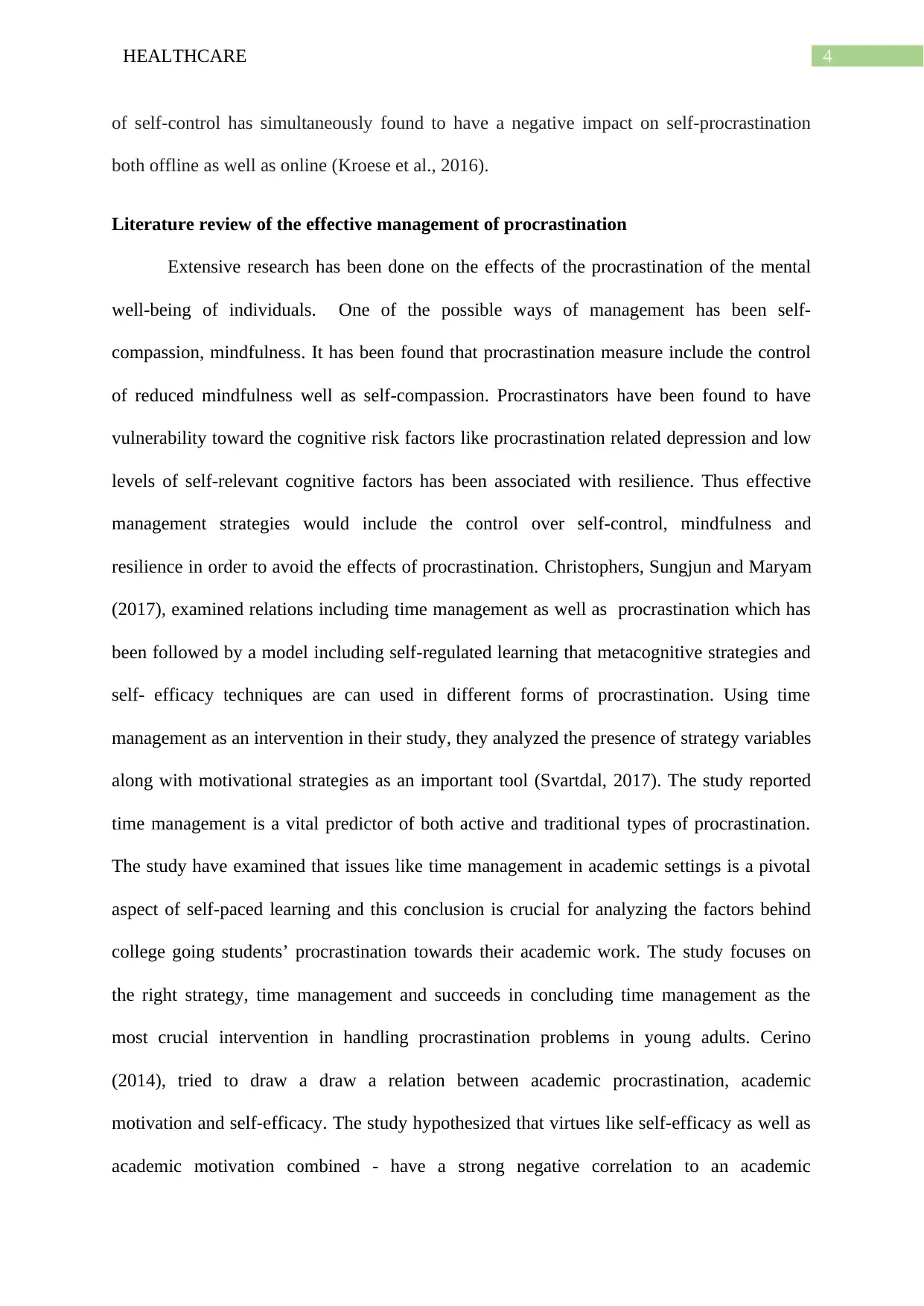
4HEALTHCARE
of self-control has simultaneously found to have a negative impact on self-procrastination
both offline as well as online (Kroese et al., 2016).
Literature review of the effective management of procrastination
Extensive research has been done on the effects of the procrastination of the mental
well-being of individuals. One of the possible ways of management has been self-
compassion, mindfulness. It has been found that procrastination measure include the control
of reduced mindfulness well as self-compassion. Procrastinators have been found to have
vulnerability toward the cognitive risk factors like procrastination related depression and low
levels of self-relevant cognitive factors has been associated with resilience. Thus effective
management strategies would include the control over self-control, mindfulness and
resilience in order to avoid the effects of procrastination. Christophers, Sungjun and Maryam
(2017), examined relations including time management as well as procrastination which has
been followed by a model including self-regulated learning that metacognitive strategies and
self- efficacy techniques are can used in different forms of procrastination. Using time
management as an intervention in their study, they analyzed the presence of strategy variables
along with motivational strategies as an important tool (Svartdal, 2017). The study reported
time management is a vital predictor of both active and traditional types of procrastination.
The study have examined that issues like time management in academic settings is a pivotal
aspect of self-paced learning and this conclusion is crucial for analyzing the factors behind
college going students’ procrastination towards their academic work. The study focuses on
the right strategy, time management and succeeds in concluding time management as the
most crucial intervention in handling procrastination problems in young adults. Cerino
(2014), tried to draw a draw a relation between academic procrastination, academic
motivation and self-efficacy. The study hypothesized that virtues like self-efficacy as well as
academic motivation combined - have a strong negative correlation to an academic
of self-control has simultaneously found to have a negative impact on self-procrastination
both offline as well as online (Kroese et al., 2016).
Literature review of the effective management of procrastination
Extensive research has been done on the effects of the procrastination of the mental
well-being of individuals. One of the possible ways of management has been self-
compassion, mindfulness. It has been found that procrastination measure include the control
of reduced mindfulness well as self-compassion. Procrastinators have been found to have
vulnerability toward the cognitive risk factors like procrastination related depression and low
levels of self-relevant cognitive factors has been associated with resilience. Thus effective
management strategies would include the control over self-control, mindfulness and
resilience in order to avoid the effects of procrastination. Christophers, Sungjun and Maryam
(2017), examined relations including time management as well as procrastination which has
been followed by a model including self-regulated learning that metacognitive strategies and
self- efficacy techniques are can used in different forms of procrastination. Using time
management as an intervention in their study, they analyzed the presence of strategy variables
along with motivational strategies as an important tool (Svartdal, 2017). The study reported
time management is a vital predictor of both active and traditional types of procrastination.
The study have examined that issues like time management in academic settings is a pivotal
aspect of self-paced learning and this conclusion is crucial for analyzing the factors behind
college going students’ procrastination towards their academic work. The study focuses on
the right strategy, time management and succeeds in concluding time management as the
most crucial intervention in handling procrastination problems in young adults. Cerino
(2014), tried to draw a draw a relation between academic procrastination, academic
motivation and self-efficacy. The study hypothesized that virtues like self-efficacy as well as
academic motivation combined - have a strong negative correlation to an academic
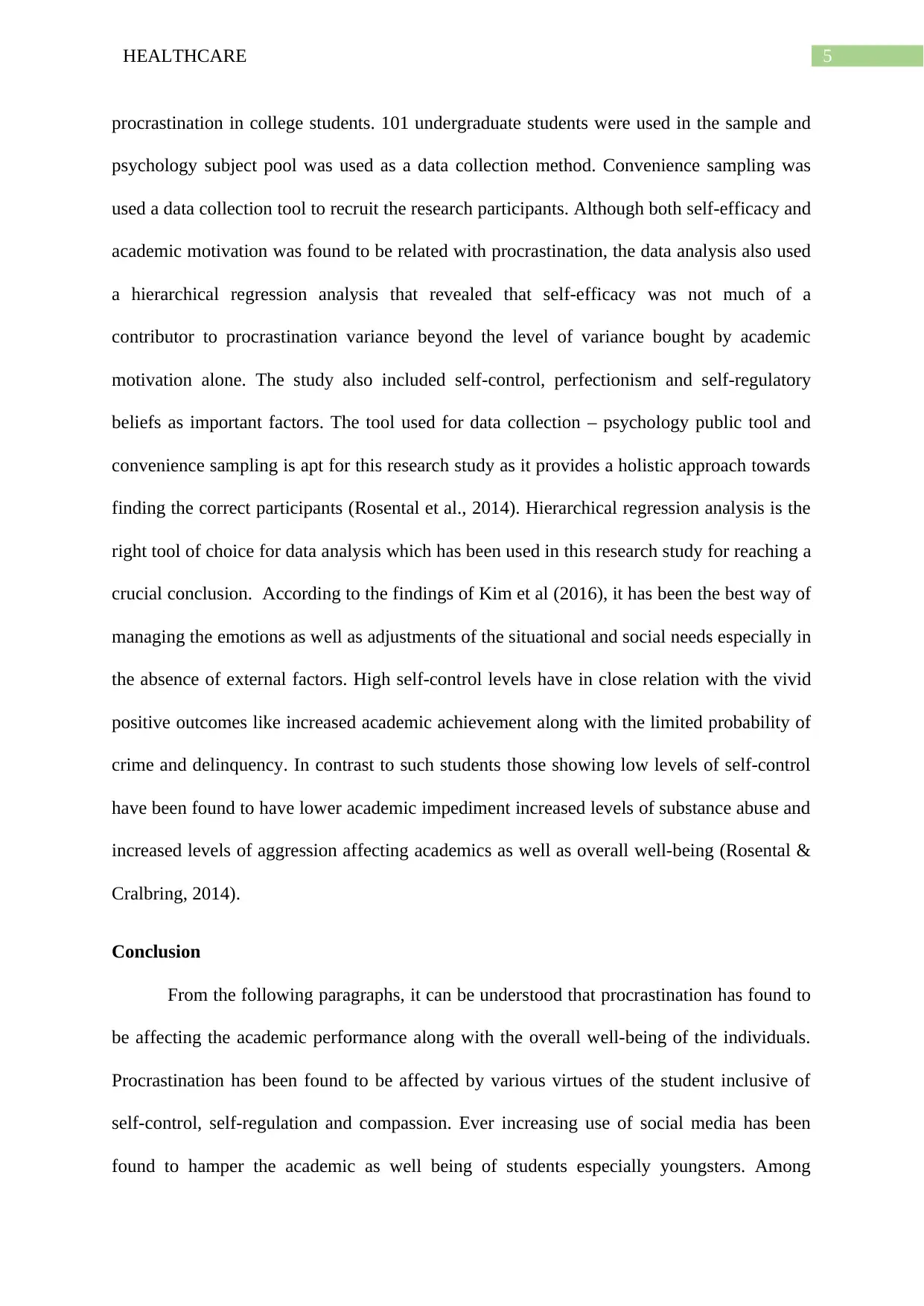
5HEALTHCARE
procrastination in college students. 101 undergraduate students were used in the sample and
psychology subject pool was used as a data collection method. Convenience sampling was
used a data collection tool to recruit the research participants. Although both self-efficacy and
academic motivation was found to be related with procrastination, the data analysis also used
a hierarchical regression analysis that revealed that self-efficacy was not much of a
contributor to procrastination variance beyond the level of variance bought by academic
motivation alone. The study also included self-control, perfectionism and self-regulatory
beliefs as important factors. The tool used for data collection – psychology public tool and
convenience sampling is apt for this research study as it provides a holistic approach towards
finding the correct participants (Rosental et al., 2014). Hierarchical regression analysis is the
right tool of choice for data analysis which has been used in this research study for reaching a
crucial conclusion. According to the findings of Kim et al (2016), it has been the best way of
managing the emotions as well as adjustments of the situational and social needs especially in
the absence of external factors. High self-control levels have in close relation with the vivid
positive outcomes like increased academic achievement along with the limited probability of
crime and delinquency. In contrast to such students those showing low levels of self-control
have been found to have lower academic impediment increased levels of substance abuse and
increased levels of aggression affecting academics as well as overall well-being (Rosental &
Cralbring, 2014).
Conclusion
From the following paragraphs, it can be understood that procrastination has found to
be affecting the academic performance along with the overall well-being of the individuals.
Procrastination has been found to be affected by various virtues of the student inclusive of
self-control, self-regulation and compassion. Ever increasing use of social media has been
found to hamper the academic as well being of students especially youngsters. Among
procrastination in college students. 101 undergraduate students were used in the sample and
psychology subject pool was used as a data collection method. Convenience sampling was
used a data collection tool to recruit the research participants. Although both self-efficacy and
academic motivation was found to be related with procrastination, the data analysis also used
a hierarchical regression analysis that revealed that self-efficacy was not much of a
contributor to procrastination variance beyond the level of variance bought by academic
motivation alone. The study also included self-control, perfectionism and self-regulatory
beliefs as important factors. The tool used for data collection – psychology public tool and
convenience sampling is apt for this research study as it provides a holistic approach towards
finding the correct participants (Rosental et al., 2014). Hierarchical regression analysis is the
right tool of choice for data analysis which has been used in this research study for reaching a
crucial conclusion. According to the findings of Kim et al (2016), it has been the best way of
managing the emotions as well as adjustments of the situational and social needs especially in
the absence of external factors. High self-control levels have in close relation with the vivid
positive outcomes like increased academic achievement along with the limited probability of
crime and delinquency. In contrast to such students those showing low levels of self-control
have been found to have lower academic impediment increased levels of substance abuse and
increased levels of aggression affecting academics as well as overall well-being (Rosental &
Cralbring, 2014).
Conclusion
From the following paragraphs, it can be understood that procrastination has found to
be affecting the academic performance along with the overall well-being of the individuals.
Procrastination has been found to be affected by various virtues of the student inclusive of
self-control, self-regulation and compassion. Ever increasing use of social media has been
found to hamper the academic as well being of students especially youngsters. Among
⊘ This is a preview!⊘
Do you want full access?
Subscribe today to unlock all pages.

Trusted by 1+ million students worldwide
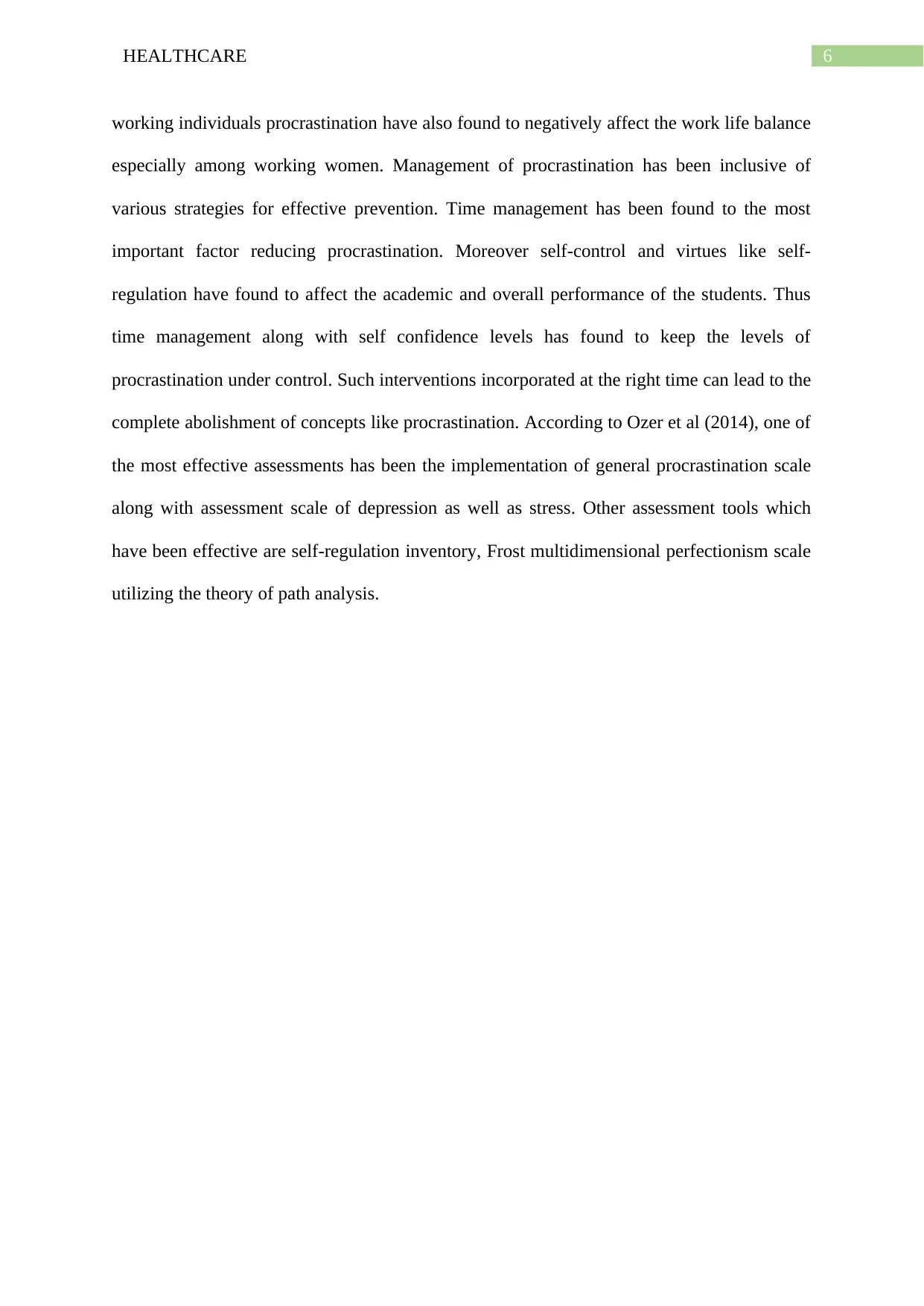
6HEALTHCARE
working individuals procrastination have also found to negatively affect the work life balance
especially among working women. Management of procrastination has been inclusive of
various strategies for effective prevention. Time management has been found to the most
important factor reducing procrastination. Moreover self-control and virtues like self-
regulation have found to affect the academic and overall performance of the students. Thus
time management along with self confidence levels has found to keep the levels of
procrastination under control. Such interventions incorporated at the right time can lead to the
complete abolishment of concepts like procrastination. According to Ozer et al (2014), one of
the most effective assessments has been the implementation of general procrastination scale
along with assessment scale of depression as well as stress. Other assessment tools which
have been effective are self-regulation inventory, Frost multidimensional perfectionism scale
utilizing the theory of path analysis.
working individuals procrastination have also found to negatively affect the work life balance
especially among working women. Management of procrastination has been inclusive of
various strategies for effective prevention. Time management has been found to the most
important factor reducing procrastination. Moreover self-control and virtues like self-
regulation have found to affect the academic and overall performance of the students. Thus
time management along with self confidence levels has found to keep the levels of
procrastination under control. Such interventions incorporated at the right time can lead to the
complete abolishment of concepts like procrastination. According to Ozer et al (2014), one of
the most effective assessments has been the implementation of general procrastination scale
along with assessment scale of depression as well as stress. Other assessment tools which
have been effective are self-regulation inventory, Frost multidimensional perfectionism scale
utilizing the theory of path analysis.
Paraphrase This Document
Need a fresh take? Get an instant paraphrase of this document with our AI Paraphraser
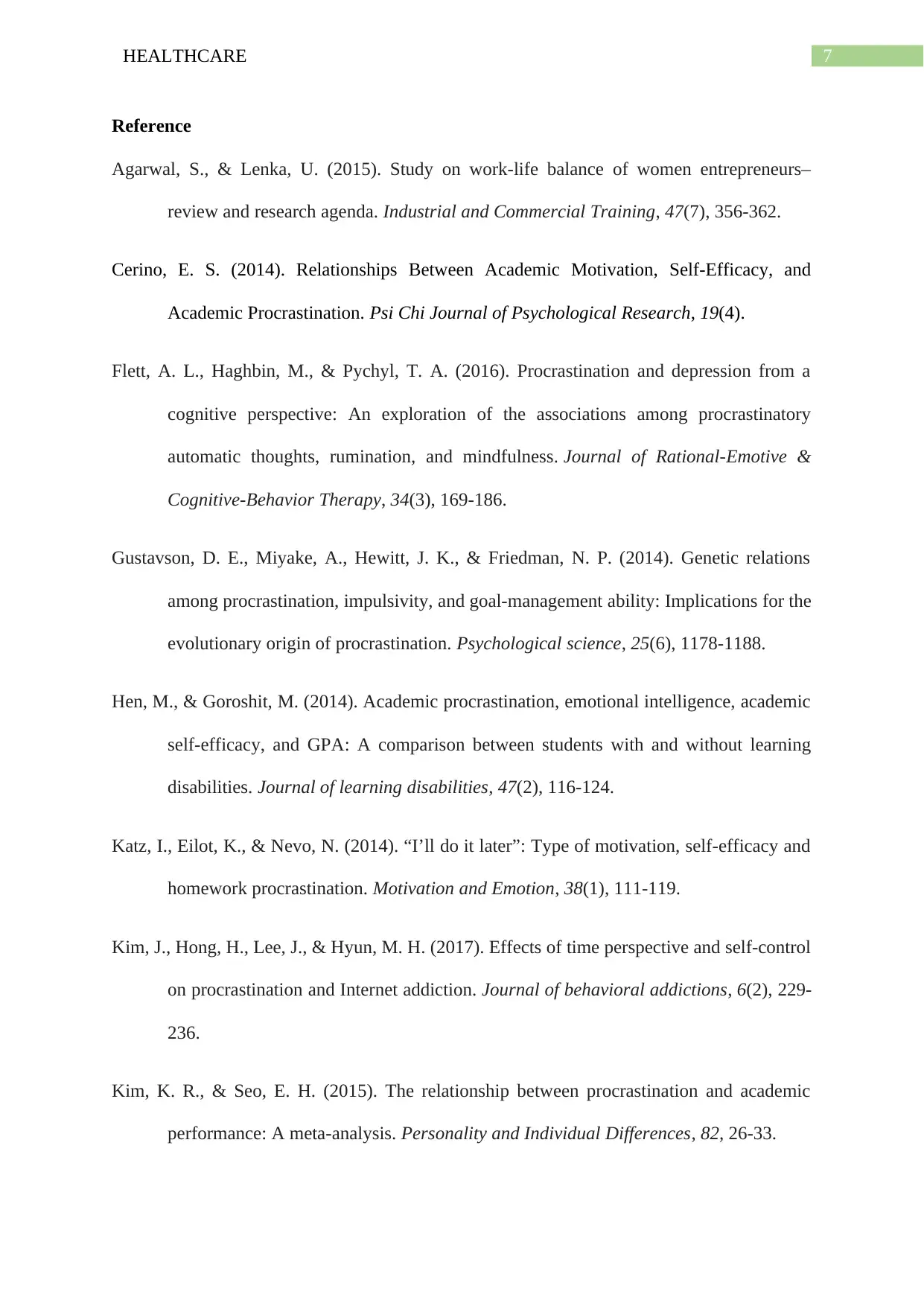
7HEALTHCARE
Reference
Agarwal, S., & Lenka, U. (2015). Study on work-life balance of women entrepreneurs–
review and research agenda. Industrial and Commercial Training, 47(7), 356-362.
Cerino, E. S. (2014). Relationships Between Academic Motivation, Self-Efficacy, and
Academic Procrastination. Psi Chi Journal of Psychological Research, 19(4).
Flett, A. L., Haghbin, M., & Pychyl, T. A. (2016). Procrastination and depression from a
cognitive perspective: An exploration of the associations among procrastinatory
automatic thoughts, rumination, and mindfulness. Journal of Rational-Emotive &
Cognitive-Behavior Therapy, 34(3), 169-186.
Gustavson, D. E., Miyake, A., Hewitt, J. K., & Friedman, N. P. (2014). Genetic relations
among procrastination, impulsivity, and goal-management ability: Implications for the
evolutionary origin of procrastination. Psychological science, 25(6), 1178-1188.
Hen, M., & Goroshit, M. (2014). Academic procrastination, emotional intelligence, academic
self-efficacy, and GPA: A comparison between students with and without learning
disabilities. Journal of learning disabilities, 47(2), 116-124.
Katz, I., Eilot, K., & Nevo, N. (2014). “I’ll do it later”: Type of motivation, self-efficacy and
homework procrastination. Motivation and Emotion, 38(1), 111-119.
Kim, J., Hong, H., Lee, J., & Hyun, M. H. (2017). Effects of time perspective and self-control
on procrastination and Internet addiction. Journal of behavioral addictions, 6(2), 229-
236.
Kim, K. R., & Seo, E. H. (2015). The relationship between procrastination and academic
performance: A meta-analysis. Personality and Individual Differences, 82, 26-33.
Reference
Agarwal, S., & Lenka, U. (2015). Study on work-life balance of women entrepreneurs–
review and research agenda. Industrial and Commercial Training, 47(7), 356-362.
Cerino, E. S. (2014). Relationships Between Academic Motivation, Self-Efficacy, and
Academic Procrastination. Psi Chi Journal of Psychological Research, 19(4).
Flett, A. L., Haghbin, M., & Pychyl, T. A. (2016). Procrastination and depression from a
cognitive perspective: An exploration of the associations among procrastinatory
automatic thoughts, rumination, and mindfulness. Journal of Rational-Emotive &
Cognitive-Behavior Therapy, 34(3), 169-186.
Gustavson, D. E., Miyake, A., Hewitt, J. K., & Friedman, N. P. (2014). Genetic relations
among procrastination, impulsivity, and goal-management ability: Implications for the
evolutionary origin of procrastination. Psychological science, 25(6), 1178-1188.
Hen, M., & Goroshit, M. (2014). Academic procrastination, emotional intelligence, academic
self-efficacy, and GPA: A comparison between students with and without learning
disabilities. Journal of learning disabilities, 47(2), 116-124.
Katz, I., Eilot, K., & Nevo, N. (2014). “I’ll do it later”: Type of motivation, self-efficacy and
homework procrastination. Motivation and Emotion, 38(1), 111-119.
Kim, J., Hong, H., Lee, J., & Hyun, M. H. (2017). Effects of time perspective and self-control
on procrastination and Internet addiction. Journal of behavioral addictions, 6(2), 229-
236.
Kim, K. R., & Seo, E. H. (2015). The relationship between procrastination and academic
performance: A meta-analysis. Personality and Individual Differences, 82, 26-33.
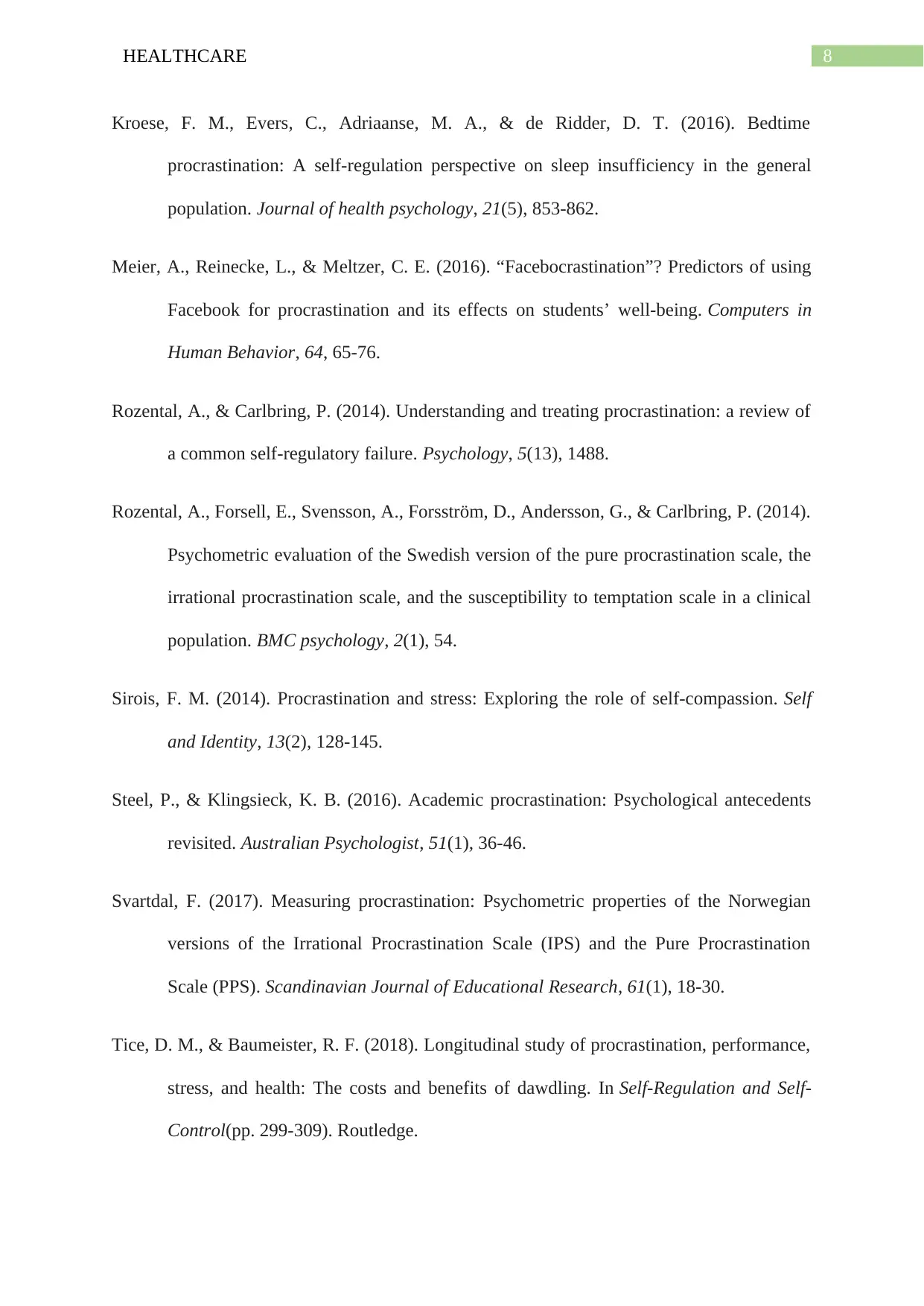
8HEALTHCARE
Kroese, F. M., Evers, C., Adriaanse, M. A., & de Ridder, D. T. (2016). Bedtime
procrastination: A self-regulation perspective on sleep insufficiency in the general
population. Journal of health psychology, 21(5), 853-862.
Meier, A., Reinecke, L., & Meltzer, C. E. (2016). “Facebocrastination”? Predictors of using
Facebook for procrastination and its effects on students’ well-being. Computers in
Human Behavior, 64, 65-76.
Rozental, A., & Carlbring, P. (2014). Understanding and treating procrastination: a review of
a common self-regulatory failure. Psychology, 5(13), 1488.
Rozental, A., Forsell, E., Svensson, A., Forsström, D., Andersson, G., & Carlbring, P. (2014).
Psychometric evaluation of the Swedish version of the pure procrastination scale, the
irrational procrastination scale, and the susceptibility to temptation scale in a clinical
population. BMC psychology, 2(1), 54.
Sirois, F. M. (2014). Procrastination and stress: Exploring the role of self-compassion. Self
and Identity, 13(2), 128-145.
Steel, P., & Klingsieck, K. B. (2016). Academic procrastination: Psychological antecedents
revisited. Australian Psychologist, 51(1), 36-46.
Svartdal, F. (2017). Measuring procrastination: Psychometric properties of the Norwegian
versions of the Irrational Procrastination Scale (IPS) and the Pure Procrastination
Scale (PPS). Scandinavian Journal of Educational Research, 61(1), 18-30.
Tice, D. M., & Baumeister, R. F. (2018). Longitudinal study of procrastination, performance,
stress, and health: The costs and benefits of dawdling. In Self-Regulation and Self-
Control(pp. 299-309). Routledge.
Kroese, F. M., Evers, C., Adriaanse, M. A., & de Ridder, D. T. (2016). Bedtime
procrastination: A self-regulation perspective on sleep insufficiency in the general
population. Journal of health psychology, 21(5), 853-862.
Meier, A., Reinecke, L., & Meltzer, C. E. (2016). “Facebocrastination”? Predictors of using
Facebook for procrastination and its effects on students’ well-being. Computers in
Human Behavior, 64, 65-76.
Rozental, A., & Carlbring, P. (2014). Understanding and treating procrastination: a review of
a common self-regulatory failure. Psychology, 5(13), 1488.
Rozental, A., Forsell, E., Svensson, A., Forsström, D., Andersson, G., & Carlbring, P. (2014).
Psychometric evaluation of the Swedish version of the pure procrastination scale, the
irrational procrastination scale, and the susceptibility to temptation scale in a clinical
population. BMC psychology, 2(1), 54.
Sirois, F. M. (2014). Procrastination and stress: Exploring the role of self-compassion. Self
and Identity, 13(2), 128-145.
Steel, P., & Klingsieck, K. B. (2016). Academic procrastination: Psychological antecedents
revisited. Australian Psychologist, 51(1), 36-46.
Svartdal, F. (2017). Measuring procrastination: Psychometric properties of the Norwegian
versions of the Irrational Procrastination Scale (IPS) and the Pure Procrastination
Scale (PPS). Scandinavian Journal of Educational Research, 61(1), 18-30.
Tice, D. M., & Baumeister, R. F. (2018). Longitudinal study of procrastination, performance,
stress, and health: The costs and benefits of dawdling. In Self-Regulation and Self-
Control(pp. 299-309). Routledge.
⊘ This is a preview!⊘
Do you want full access?
Subscribe today to unlock all pages.

Trusted by 1+ million students worldwide
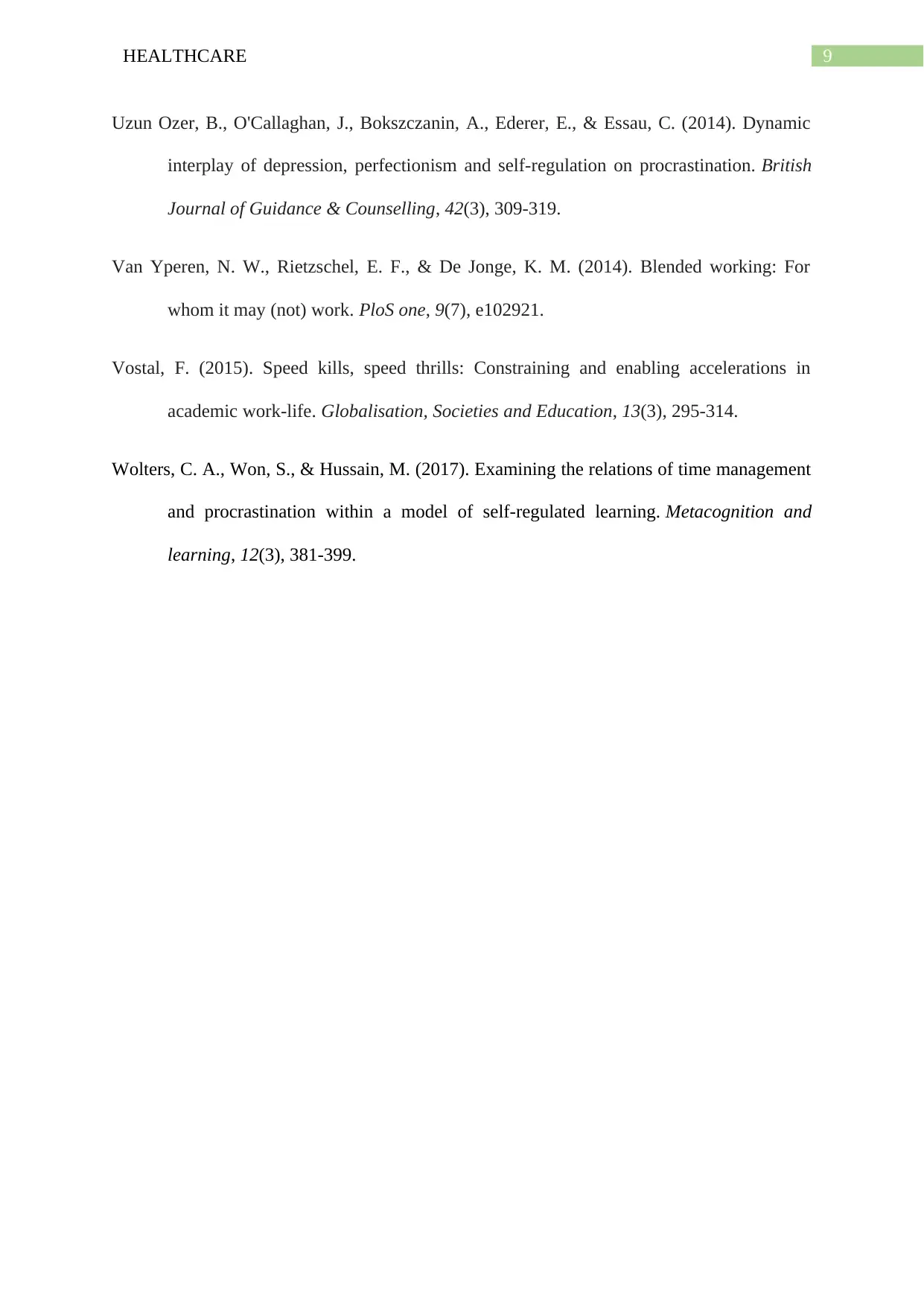
9HEALTHCARE
Uzun Ozer, B., O'Callaghan, J., Bokszczanin, A., Ederer, E., & Essau, C. (2014). Dynamic
interplay of depression, perfectionism and self-regulation on procrastination. British
Journal of Guidance & Counselling, 42(3), 309-319.
Van Yperen, N. W., Rietzschel, E. F., & De Jonge, K. M. (2014). Blended working: For
whom it may (not) work. PloS one, 9(7), e102921.
Vostal, F. (2015). Speed kills, speed thrills: Constraining and enabling accelerations in
academic work-life. Globalisation, Societies and Education, 13(3), 295-314.
Wolters, C. A., Won, S., & Hussain, M. (2017). Examining the relations of time management
and procrastination within a model of self-regulated learning. Metacognition and
learning, 12(3), 381-399.
Uzun Ozer, B., O'Callaghan, J., Bokszczanin, A., Ederer, E., & Essau, C. (2014). Dynamic
interplay of depression, perfectionism and self-regulation on procrastination. British
Journal of Guidance & Counselling, 42(3), 309-319.
Van Yperen, N. W., Rietzschel, E. F., & De Jonge, K. M. (2014). Blended working: For
whom it may (not) work. PloS one, 9(7), e102921.
Vostal, F. (2015). Speed kills, speed thrills: Constraining and enabling accelerations in
academic work-life. Globalisation, Societies and Education, 13(3), 295-314.
Wolters, C. A., Won, S., & Hussain, M. (2017). Examining the relations of time management
and procrastination within a model of self-regulated learning. Metacognition and
learning, 12(3), 381-399.
1 out of 10
Related Documents
Your All-in-One AI-Powered Toolkit for Academic Success.
+13062052269
info@desklib.com
Available 24*7 on WhatsApp / Email
![[object Object]](/_next/static/media/star-bottom.7253800d.svg)
Unlock your academic potential
Copyright © 2020–2026 A2Z Services. All Rights Reserved. Developed and managed by ZUCOL.





